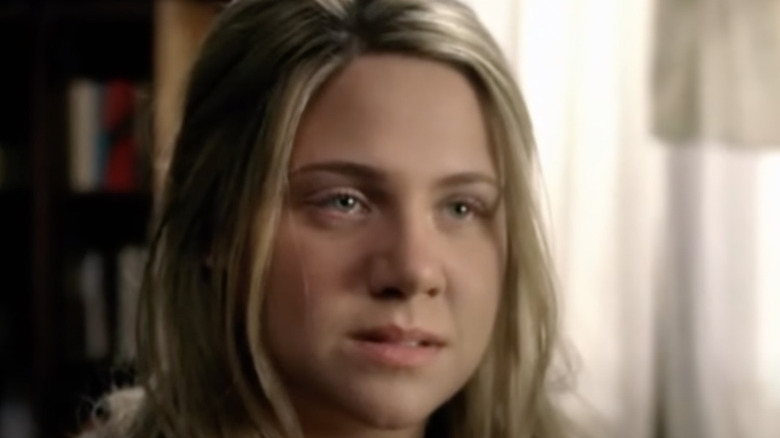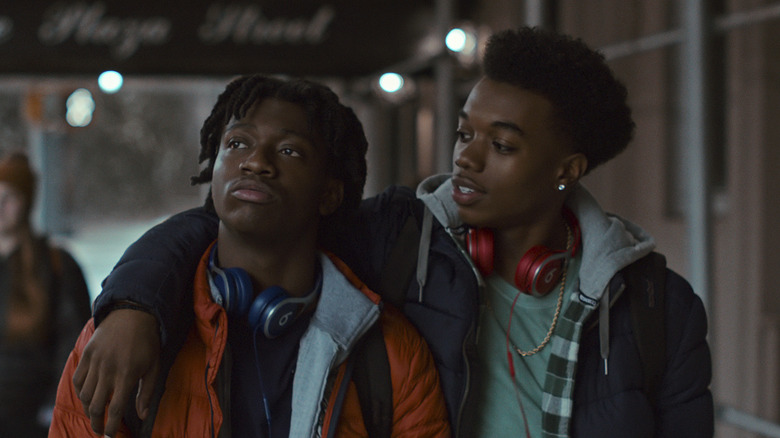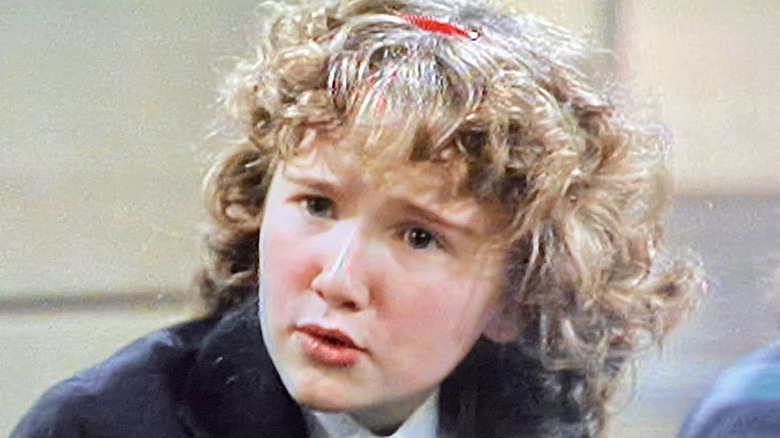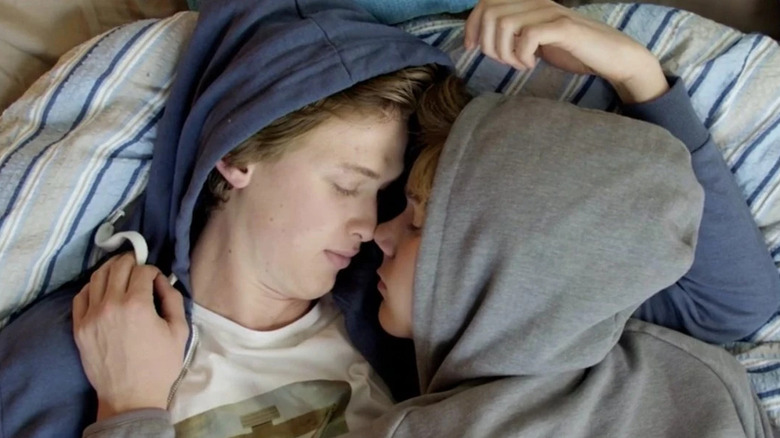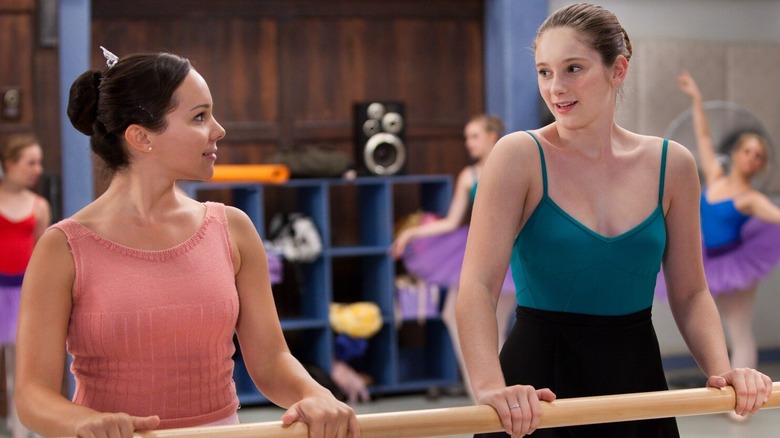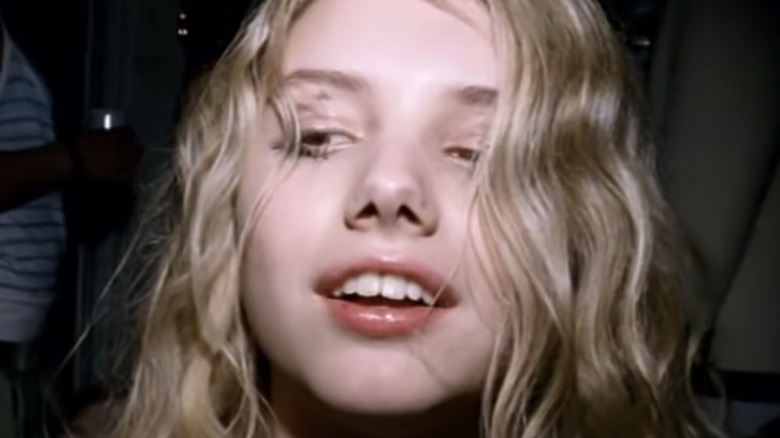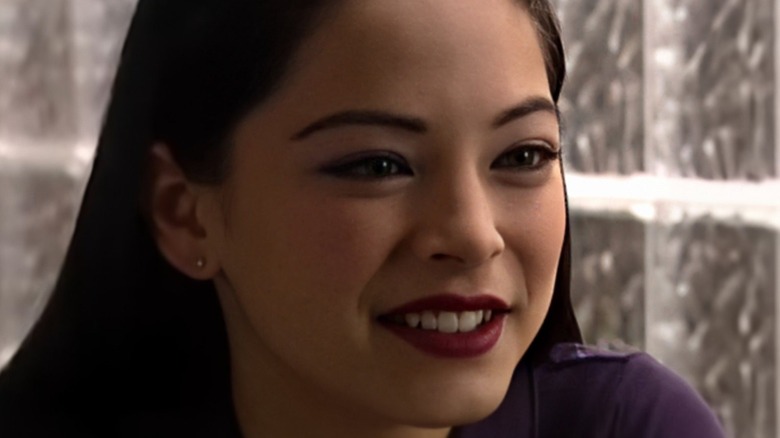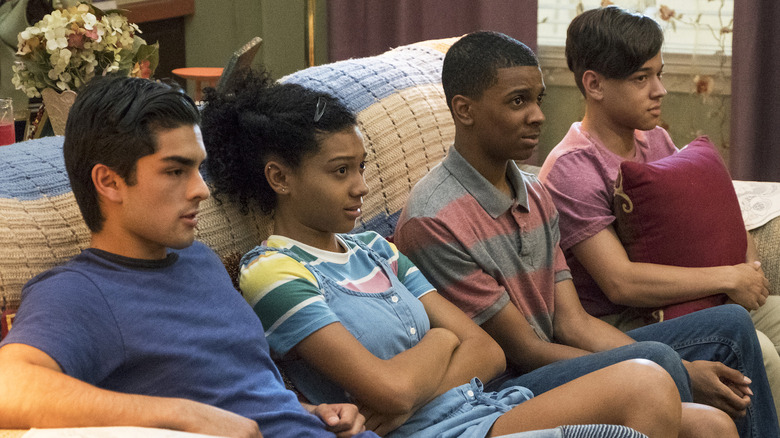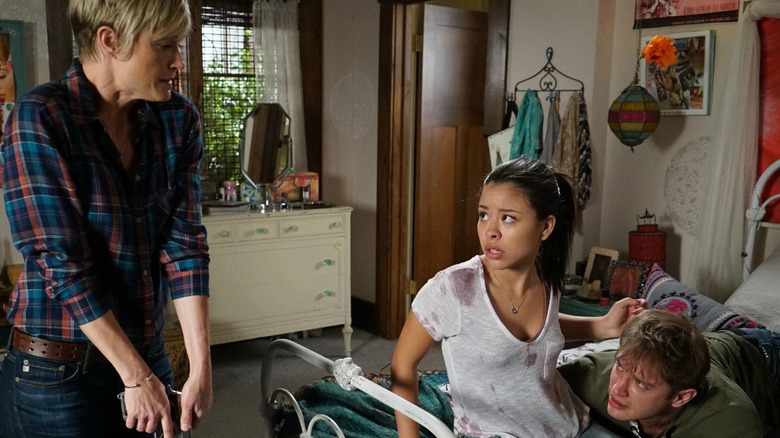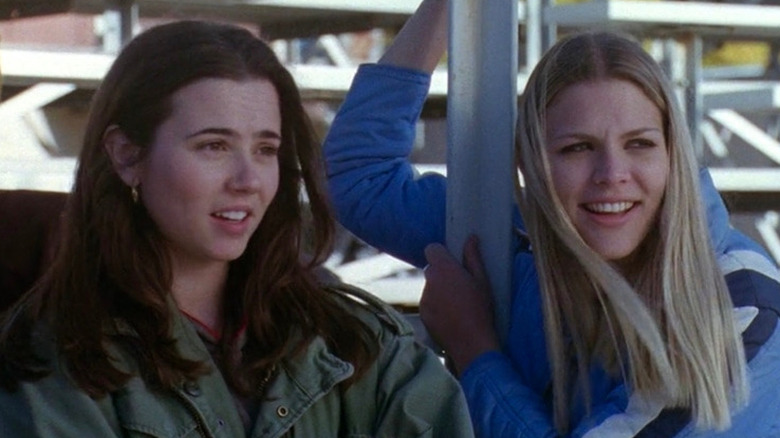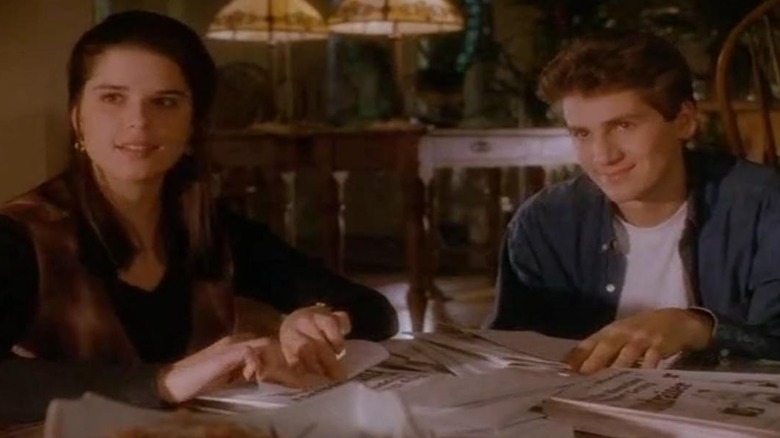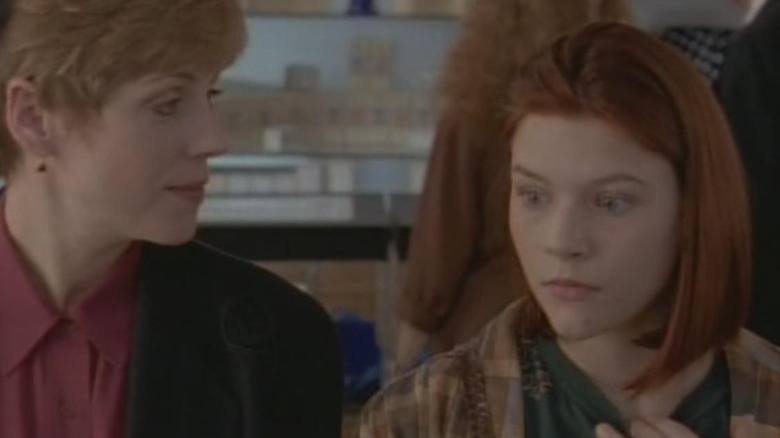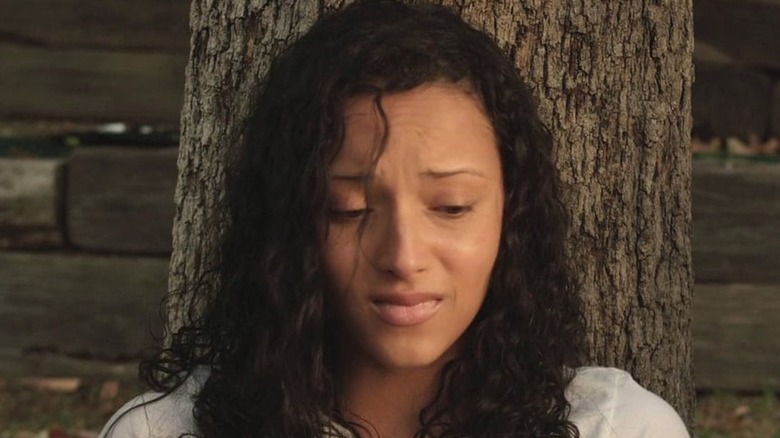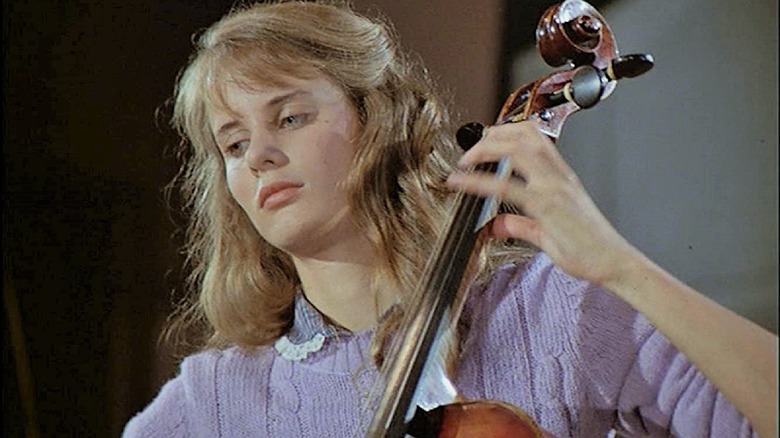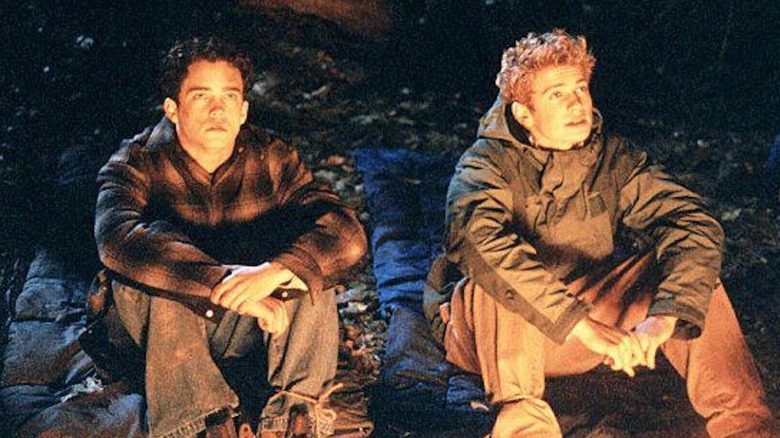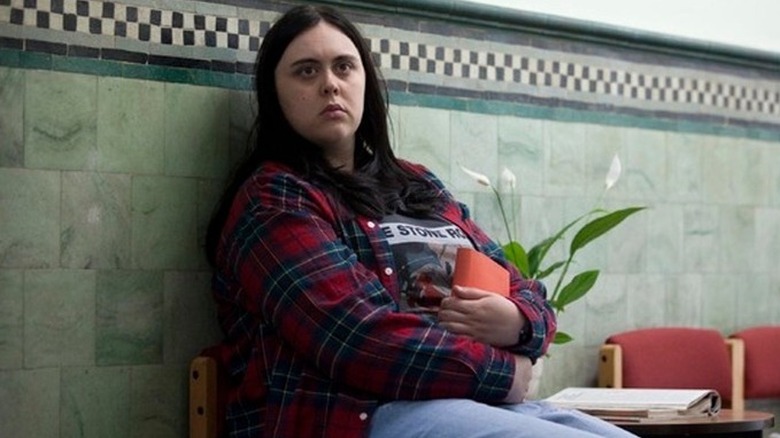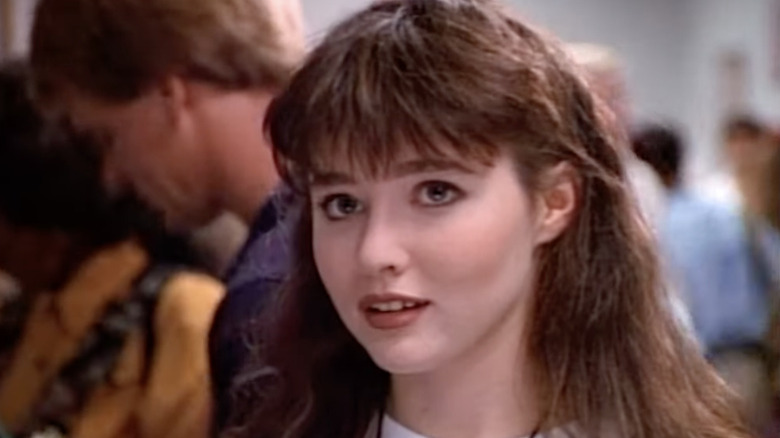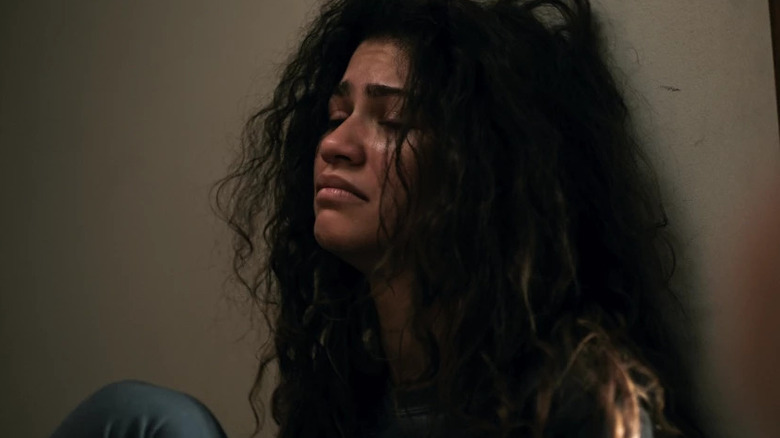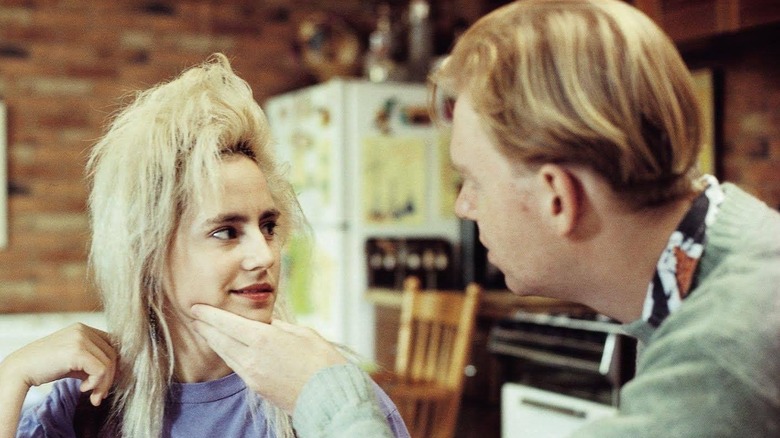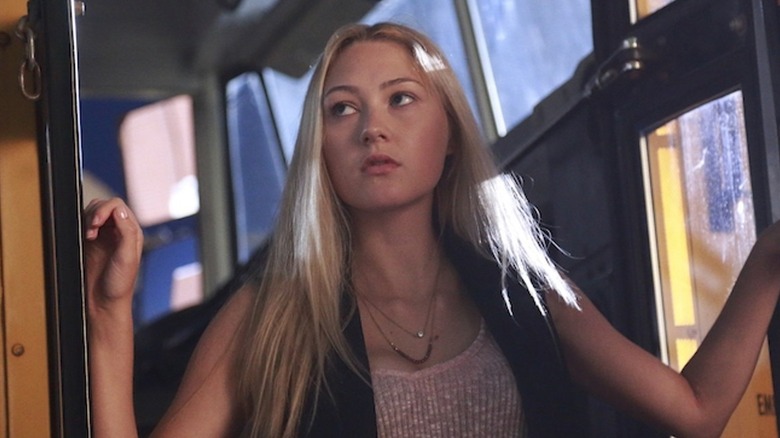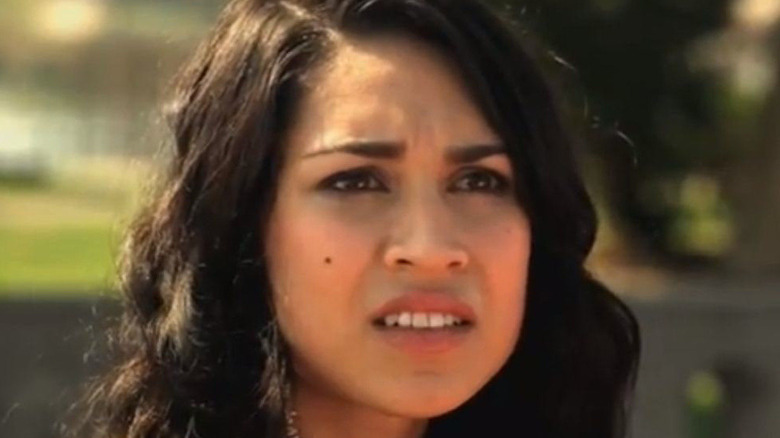20 Shows Like Degrassi: The Next Generation Fans Should Watch
Premiering in the fall of 2001, "Degrassi: The Next Generation" — a spin-off of beloved Canadian series "Degrassi Junior High" and "Degrassi High" — lasted for a remarkable 14 seasons before its cancellation. And according to folks like Teen Vogue's Gabe Bergado, the show and franchise have become a "huge cultural phenomenon." So much so that Netflix revived it for its "Degrassi: Next Class" iteration. That stint is now over, but don't fret because HBO Max has plans to bring another installment into the fold, which we all anxiously await.
Created by former schoolteacher Linda Schuyler and "Degrassi Junior High" head writer Yan Moore, "Degrassi: The Next Generation" stands apart from the standard teen drama fare of its time because it offers grounded, socially-minded coming-of-age stories ... with age-appropriate actors, no less! While other shows may lean into glossy wish fulfillment, in which teens are played by model-ready twenty-and-thirty-somethings waltzing around like fully formed adults obsessed with their relationships, "Degrassi: The Next Generation" is more concerned with being true to its viewers. Even at its cheesiest, this beloved show is full of genuine heart, and the fact that the creators value authenticity and real representation regarding the trials and tribulations of adolescence is very clear in the deftly handled, issue-based narratives.
We still have a while to wait for HBO's version of "Degrassi," so we've compiled a list of 20 shows similar to "Degrassi: The Next Generation" that are worth checking out in the meantime.
Grand Army
"Grand Army" follows five teens as they navigate their high school years in Brooklyn, New York. The show premiered on Netflix in the fall of 2020, but has already joined the ranks of shows that were canceled too soon. Full disclosure: though the show has enjoyed generally positive reception, the cancellation came some time after the showrunner and creator was accused of "racist exploitation and abuse" via Twitter by writer Ming Peiffer, who worked on the teen drama. What happens behind the scenes is as important as what makes it to the screen, which makes watching "Grand Army" more complicated, as Peiffer has further elaborated about the experiences of writers of color working on the show.
If we've learned anything from the Joss Whedon controversy, it's that one person does not make an entire series or legacy. In the same way we still embrace Sarah Michelle Gellar as the Slayer and Alyson Hannigan as Sunnydale's resident (good) witch, the cast, crew, and writers of "Grand Army" deserve recognition for their work. Redditors like u/daniella_04 have taken to discussion boards to praise the diversity of the characters, as well as the show's realism, and Rolling Stone critic Alan Sepinwall commends the show for occasionally "elevating surprisingly close to the genre's thoughtful standard-bearer, 'My So-Called Life.'"
Based on Katie Cappiello's stage-play, "Slut: The Play," this short-lived coming-of-age series is just as issue-based as "Degrassi: The Next Generation." Its leads — Joey (Odessa A'zion), Sid (Amir Bageria), Jayson (Maliq Johnson), Leila (Amalia Yoo), and Dom (Odley Jean) — are entrenched in storylines involving everything from the aftermath of sexual assault to discovering one's sexual orientation to the terrifying reality of terrorism. While worth watching, we'd advise treading with caution, because it's a grittier, bleaker take on the trials and tribulations of modern-day adolescence.
Grange Hill
"Grange Hill" is like the British counterpart to the "Degrassi" franchise. While it originally aired from 1978 to 2008, we'd say the '80s and '90s are its heyday. Set in a fictional borough of North London, the long-running program follows the students of a comprehensive school and — for most of its lifetime, at least — offers similarly grounded and socially relevant narratives like "Degrassi."
Created by Sir Phil Redmond (who also created the popular primetime soap "Hollyoaks"), "Grange Hill" also features an ensemble cast made of a revolving door of characters, who are played by age-appropriate actors. According to The Guardian's Tara Conlan, the show "broke new ground over the years, with the kind of hard-hitting storylines not usually seen in children's dramas," such as violent bullying and one character's life-destroying heroin addiction.
Despite its popularity and groundbreaking status, the network decided to cripple the series in the early aughts by instating a policy requiring that all content airing in the afternoons appeal to children under the age of 12. This effectively threw the show's teenage fanbase to the wind in favor of fluffier, more light-hearted tween shenanigans. It prompted Redmond to call for its cancellation, lamenting, "I don't like keeping things going when the point has been lost" (via The Guardian). Nowadays, you can stream this once controversial coming-of-age classic on BritBox, and rumor has it that a new iteration of "Grange Hill" is coming our way — this time in movie form (via BBC).
Skam (Norway)
Norway's "Skam" became an international sensation during its original run because of its unique format and its realistic depictions of teen life (via Medium). As each season aired, clips would drop on social media in real-time throughout the week, with some as short as a minute. At the end of each week, those clips would then be combined to create one "full" episode on the Norwegian Broadcasting Corporation's website. As The Fader's Patrick D. McDermott writes, "Being a teenager is a beautiful mess. It's miserable ... but there's also something strangely poetic about the urgency of it all," and "like the greatest shows about teenage life ... 'Skam' never trivializes these feelings."
Created by Julie Andem, the series centers around a group of teens attending the Oslo-based prep school Hartvig Nissen, and every season focuses on one character's story. Just like "Degrassi: The Next Generation," the show portrays socially relevant issues like relationship troubles, eating disorders, sexual violence, mental illness, and coming out. Plus our protagonists are refreshingly played by age-appropriate actors here, which helps phenomenally with the show's authenticity (via The Atlantic).
Though it only lasted for four seasons, "Skam" spawned multiple remakes in other countries, including one in the U.S. called "SKAM Austin" that Julie Andem herself had a direct hand in (via The New Yorker). Ultimately, this series offers a grounded teen drama via an innovative, social media-oriented approach to storytelling, and we'd say that it's definitely worth a watch for those craving "Degrassi"-esque content.
Dance Academy
In the same way that Emma Nelson (Miriam McDonald) first brings us into the world of Degrassi Community School, aspiring ballerina Tara Webster (Xenia Goodwin) brings us into the world of Sydney's National Academy of Dance in "Dance Academy." As Tara and her classmates work on perfecting their techniques, so they can launch professional careers upon graduation, they also experience the tumultuous ups and downs that come with growing up and trying to find your place in the world.
According to The Guardian's Cassie Tongue, this Australian teen drama's characters are "believable teenagers. Charming, awkward, and headstrong, they make short-sighted decisions while trying to be better dancers and people." Sound familiar? The teens in this show may all be super talented dancers with promising futures, but they're also still dealing with the relatable pains of adolescence. Like the "Degrassi: The Next Generation" students, they're no strangers to issues like eating disorders, sexual orientation, complicated families, and even abusive teacher-pupil relationships. Added bonus: If you do check this gem out, you'll get to see Keiynan Lonsdale (a.k.a. "The Flash's" Wally West/Kid Flash) as the skilled-but-cocky Ollie Lloyd!
Skins (UK)
In the ensemble U.K. teen drama, "Skins," each episode centers on one particular character (or the relationship or friendship between two or three of them). The show begins with the manipulative, promiscuous, and popular Tony Stonem (Nicholas Hoult). The format makes each storyline feel like a character study, and we get relatively deep looks into the complicated lives of teens, as they grapple with issues like eating disorders, parental death, PTSD, and drug abuse.
In response to a Reddit post asking for recommendations for shows like "Degrassi," Redditor u/discos_panic describes this series as the Canadian program's "edgy older brother," and that's how we feel about it too. While "Skins" is grittier and darker — these Bristol teens are far more hedonistic than our favorite Toronto high schoolers — the narratives in this coming-of-age dramedy offer an admirable amount of authenticity. "Skins" was created by father-son duo, Bryan Elsley and Jamie Brittain, who hired young and sometimes inexperienced writers in their early 20s to better represent its content and to make it more relatable and truthful for its young adult target audience (via The New York Times).
Edgemont
Responding to another Redditor asking for "shows that give Degrassi vibes," Reddit user u/for-never-after pointed the OP towards "Edgemont," another Canadian teen drama of the early aughts. Created by Ian Weir, the series follows the students of McKinley, a school in a Vancouver suburb, as they navigate friendships, relationships, families, their images, and other topics socially relevant to high schoolers. The show gets even soapier than "Degrassi: The Next Generation," partly due to its heavy focus on the characters' various romances (and jealousies). But it still offers many grounded narratives that will resonate with viewers, from its depiction of the aftermath of divorce to a character coming to terms with her sexuality, while growing up in a religious, conservative household.
"Edgemont" didn't last as long as "Degrassi: The Next Generation," but with its five-year run, it does enjoy more screen time than American teen staples like "My So-Called Life" and "Freaks and Geeks." The show actually matures with its characters, which allows for a surprising amount of depth and nuance as the series progresses. Plus, you'll get to see a pre-"Smallville" Kristen Kreuk as the new girl, Laurel, who joins the school from Toronto.
On My Block
Netflix's coming-of-age dramedy, "On My Block" — created by Lauren Iungerich, Eddie Gonzalez, and Jeremy Haft — garnered a lot of praise during its four-season run. Vulture's Matt Seitz commends it for "how it folds crime and the awareness of potential violence into everyday life," and Shadow and Act's Trey Mangum believes it's "different than anything we've seen in television in relation to the experience of growing up," with the characters "dealing with real issues that happen in communities that they have to wrangle with during this pivotal time in their lives." "On My Block" offers its young adult audience a gritty, witty, grounded, and socially aware show that represents the experiences of teens who come of age against the backdrop of rough, inner-city neighborhoods, where violence is both normalized and also a constant, lurking threat.
The series follows four friends: Monsé (Sierra Capri), Ruby (Jason Genao), Jamal (Brett Gray), and Cesar (Diego Tinoco). They're at the start of their high school careers, and the different trajectories of their lives threaten to pull them apart. The show boasts an appropriately diverse and baby-faced cast, which helps immensely with its believability and realism. Like "Degrassi: The Next Generation," it doesn't sensationalize the characters' issues or problems. It's not afraid to confront hard-hitting and relevant topics like gun violence, parental deportation, and gang initiation, and it does so through an unflinching lens.
The Fosters
While admittedly more family-focused than "Degrassi: The Next Generation," Freeform's drama, "The Fosters," still focuses on a group of teens, who attend a charter school in the suburbs of San Diego, California. These kids just also happen to be part of a blended family.
Created by Peter Paige and Bradley Bredeweg, and executive produced by Jennifer Lopez, the series follows married, biracial, same-sex couple Stef and Lena, as they help their family of biological, adopted, and foster kids navigate the realities of the world. It's just as socially minded as "Degrassi: The Next Generation," as "The Fosters" depicts issue-based narratives we don't often see aptly portrayed in popular media. For example, some characters fall through the cracks of the U.S.'s dangerously broken foster care system and pay for it with their lives; Jude questions his sexual orientation and identity; step-siblings Callie and Brandon begin a taboo romantic relationship; and Jesus learns to live with his brain trauma.
With a diverse cast, authentic trans representation, and hard-hitting storylines, "The Fosters" is definitely worth a watch for any "Degrassi" fan. And if you enjoy it enough, you can move onto its spin-off, "Good Trouble," which centers on adoptive siblings Callie and Mariana, as they start their lives as young professionals in L.A.
Freaks and Geeks
Vanity Fair's Robert Lloyd calls Paul Feig and Judd Apatow's 1999 cult classic a "beautiful and ambitious television series" that "nailed the sad, hilarious unfairness of teen life" and "always preferred emotional truth to rosy outcomes," and we wholeheartedly agree. This coming-of-age dramedy may have only lasted for one season, but it's a glorious one. Set in the early '80s in a fictional suburb of Detroit, the show centers the Weir siblings: junior Lindsay (Linda Cardellini) and freshman Sam (John Francis Daley), as they navigate William McKinley High School with their respective friend groups. As Lindsay tries to reinvent her image from studious mathlete to rebellious slacker by becoming friends with the "freaks," Sam and his "geeks" try to just figure out how to fit in.
We liken "Freaks and Geeks" to "Degrassi: The Next Generation" because of its unwavering focus on the emotional complexities of adolescence, and because many characters are played by age-appropriate actors. These factors give both of these shows some notable — and exceptionally compelling — authenticity. Nowadays, many of the actors behind these characters — including James Franco, Seth Rogan, and Jason Segel — are all famous faces. But during their tenure on "Freaks and Geeks," they're refreshingly young, unknown, and not glammed up, which helps immensely with roles and storylines that emphasize the awkward reality of teen-hood. The show has left such an enduring legacy because its fans, like Redditor u/JKaye57, can genuinely relate to the kids of William McKinley and their experiences.
Party of Five
We may all know Neve Campbell best from the "Scream" franchise, but before she was ever Final Girl Sidney Prescott, she was middle child Julia Salinger in Fox's poignant 1994 drama, "Party of Five." The series follows the five newly orphaned Salinger siblings, as they grapple with the tragic loss of their parents, who were killed by a drunk driver. They do their best to stay together as a family and learn how to raise themselves in a world that just doesn't seem to care. Money is a real, visceral concern — and so is social services. According to Sandy Grushow, the former chairman of the Fox Television Entertainment Group, "Party of Five" was originally conceived to fill the void "Beverly Hills, 90210" would leave behind if "90210" ended after its fourth season. He "wanted a show that would possess many of the same values that '90210' had in the beginning. A show about teenagers and for teenagers" (via Los Angeles Times).
The A.V. Club's Emily St. James claims that this show "is the great forgotten drama of the '90s," but we certainly haven't forgotten this earnest, award-winning, six-year saga that propelled the careers of Neve Campbell, Jennifer Love Hewitt, and Matthew Fox. Like "Degrassi: The Next Generation," the series isn't afraid to explore mature themes in thoughtful ways for its target audience, with issue-led storylines that include teen pregnancy, abortion, alcoholism, and domestic violence.
My So-Called Life
The mid-'90s classic, "My So-Called Life," follows sophomore Angela Chase (Claire Danes) and her small circle of friends, as they try to figure out who they are during their tumultuous teenage years at Liberty High.
Similarly to "Degrassi: The Next Generation," there's no gloss here. These teen protagonists aren't mini models portrayed by twenty-somethings, who dress in brand-name clothes and successfully frequent bars and clubs despite their supposed ages. Instead, the characters in "My So-Called Life" are simply high school kids, who look and talk the way you would expect or remember. Some have authentically complicated relationships with their parents, and in a refreshingly realistic twist, our protagonists here try — and fail! — to get into a nightclub.
"Everwood" creator Greg Berlanti claims Winnie Holzman's one-season hit — which launched both Claire Danes and Jared Leto into fame — is "the most painfully honest portrayal of adolescence ever on television" (via Entertainment Weekly). Den of Geek's Carley Tauchert commends the show's storytelling approach: "The characters were based in reality, they didn't learn something at the end of each episode and issues were never neatly tied up in a bow." Like "Degrassi: The Next Generation," this coming-of-age drama is not afraid to confront difficult topics, ranging from dealing with substance abuse to discovering sexual orientation to coping with undiagnosed learning disabilities. What's more is that, in true real world fashion, these issues are ongoing themes rather than one-and-done episodic narratives.
East Los High
Hulu's teen drama "East Los High" boasts a predominantly Latino cast and crew, and like "Degrassi: The Next Generation," it aims to be true to the lives of its adolescent viewers by showcasing storylines that are representative of real experiences. NPR's Maanvi Singh explains how underneath all the "frothy" soapiness of "East Los High" is a "science experiment, conducted by a team of social scientists and health workers in cahoots with screenwriters and studio executives." Essentially, all these experts in their respective fields banded together to create an engaging, educational program that is capable of having a real, positive impact on young lives. And the best part is that the series manages to do this without moralizing. How many coming-of-age teen dramas can we actually say that about?
Set in an inner city neighborhood in East Los Angeles, the show centers on the various students of East Los High and explores many issues, including sex, drug use, teen pregnancy, teen motherhood, domestic violence, and HIV. All in all, if you enjoy "Degrassi: The Next Generation," we suspect that you'll likely enjoy this hit show too — quite a bit, in fact!
Fame
One of "Degrassi: The Next Generation's" best traits is its authenticity, and "Fame" has that same genuine tone and earnestness. Sometimes, it's to the point of cheesiness, but isn't that also something we love about "Degrassi?" Another ensemble cast consisting of actually age-appropriate actors, "Fame" (based on the 1980 movie musical of the same name), follows various students at the New York City High School for the Performing Arts. Much of its authenticity comes from the fact that it's heavily inspired by an actual Manhattan-based performing arts high school, and as a result, it aligns closely with the experiences of real-life students (via New York Post).
Ultimately, if you mashed "Degrassi" and "Glee" together, this 1982 teen musical dramedy would be the end result. It's glossier than "Degrassi," but still depicts topical issues like racism, body dysmorphia, and the death of a parent. And it's truer to life than "Glee," which is just as musically inclined, but has a tendency to veer into absurdity. The teens here are scrappy go-getters with visions of stardom, but at the end of the day, they're also just adolescents coming of age against the backdrop of a (sometimes gritty) urban world.
Higher Ground
"Higher Ground" focuses on a group of troubled teens attending Mount Horizon High School, which is tailored to helping at-risk youth work through their issues, while living in an isolated mountain community in the American Northwest. Think of that community as one-part boarding school, one-part rehabilitation center, and one-part wilderness survival training camp.
Every character in this ensemble gets their time to shine, as we delve into each teen's individual struggles. But protagonist Scott — played by a baby-faced Hayden Christensen (before he was ever Anakin Skywalker) — kicks off the narrative. After turning to drugs to cope with his stepmother's sexual abuse, Scott finds himself carted against his will to Mount Horizon, where he's encouraged to tackle his problems. It's clear he doesn't want to be here, but it's also clear he doesn't want to go home (and for good reason).
Similarly to how the majority of "Degrassi: The Next Generation" episodes are named after song titles, a quote from a famous writer or notable figure accompanies each episode of "Higher Ground." For example, the pilot uses Oscar Wilde's line, "We are all in the gutter, but some of us look at the stars." Also similar to "Degrassi" are the socially relevant storylines. Considering the basic premise is "school tries to support vulnerable teens," we'd say this one goes even deeper than "Degrassi" in its explorations of drug use, self-harm, disordered eating, neglect, mental illness, and physical, sexual, and verbal abuse.
If you or anyone you know has been a victim of sexual assault, help is available. Visit the Rape, Abuse & Incest National Network website or contact RAINN's National Helpline at 1-800-656-HOPE (4673).
My Mad Fat Diary
The British coming-of-age dramedy "My Mad Fat Diary" takes place in Stamford, Lincolnshire in the mid-'90s and focuses on sixteen-year-old Rae Earl (Sharon Rooney), a plus-sized teen who's just been discharged after a four-month stint in a psychiatric hospital. While there, she worked on her body image issues and depression, and though she feels well enough to re-enter the world she left behind, she's not yet ready to let best friend Chloe (Jodie Comer) know where she's really been all this time. She just wants to settle into some semblance of normalcy: hanging out with her friends, crushing on Finn (Nico Mirallegro), and visiting new friend Tix (Sophie Wright), who's still hospitalized for her life-threatening eating disorder.
The Guardian's Sam Wollaston calls this popular teen show "lovely — honest and painful, real, and very funny," praising Sharon Rooney as "natural, effortless and utterly believable." We'd add that part of the reason the series feels so authentic and heartfelt is because it's based on the diaries of the real-life Rae and modeled after the truth of her own experiences (via Digital Spy).
Ultimately, this one earns a place on our list because of that honesty, and also because of its careful and sensitive depiction of mental health, eating disorders, and the reality of tragically losing a friend. All of this culminates into a coming-of-age story that's comparable to what some "Degrassi: The Next Generation" characters have gone through.
If you or someone you know is struggling with mental health, please contact the Crisis Text Line by texting HOME to 741741, call the National Alliance on Mental Illness helpline at 1-800-950-NAMI (6264), or visit the National Institute of Mental Health website.
Beverly Hills, 90210
According to The New York Times' Caryn James, Darren Star's '90s teen staple "effectively touches the problems of teenagers maneuvering from the carefree days of childhood to the sex-and-drug culture of their peers," and as a result, just like "Degrassi: The Next Generation," it navigates many socially topical issues, like sex, substance abuse, homophobia, abuse, and antisemitism ... just to name a few. The main difference here is that these kids are in the rich, predominantly white bubble of the 90210 zip code. In this show, we learn that sometimes rich kids have real problems too. At least, this is what teen twins Brenda (Shannen Doherty) and Brandon (Jason Priestley) Walsh discover when they move from Minnesota to sunny California.
If we're being honest, the series treads a fine line, ultimately offering its viewers a blend of "Degrassi"-like narratives and "Gossip Girl"-esque glossiness. Similar to early aught shows like "The O.C." and "One Tree Hill," it can lean pretty heavily into the relationship dramas between the characters — especially the heated love triangle between Brenda, Kelly (Jennie Garth), and Dylan (played by the late Luke Perry). But "Beverly Hills: 90210" still manages to find a good amount of time for its more realistic depictions of teenage life, and for that, we'd say that it's worth a watch for any "Degrassi" fan.
Euphoria
We've included "Euphoria" because of the high number of Redditors, like u/baptised_ata_chillis, who've taken to the discussion boards to compare it to "Degrassi: The Next Generation." One Reddit user calls this HBO teen drama "just rated R Degrassi," while another user claims, "Degrassi walked so Euphoria could run." Drake himself (a.k.a. "Degrassi's" Jimmy Brooks) serves as an executive producer, and the character of Maddy Perez (Alexa Demie) is strikingly reminiscent of Cassie Steele's Manny Santos, which may only help to fuel those fiery comparisons.
Not everyone agrees with this assessment, though. While Redditor u/rachelvioleta understands why some folks see similarities, they ultimately consider "Euphoria" to be more nihilistic and less relatable than "Degrassi: The Next Generation." Of course, the only way to know which camp you fall into is to check out the show.
Written and created by Sam Levinson, "Euphoria" follows an ensemble cast of high schoolers, with Zendaya headlining as Rue Bennet, who narrates the story. Like "Degrassi: The Next Generation," the show explores socially relevant, issue-based storylines, including ones that revolve around self-harm, gender identity, and substance abuse. Rue, for instance, turns to drugs after the death of her father. Ultimately, just like the students of Degrassi Community School, Rue and her peers are just trying to figure out who they are in this messy world while dealing with — and hopefully overcoming — their traumas.
If you or anyone you know is struggling with addiction issues, help is available. Visit the Substance Abuse and Mental Health Services Administration website or contact SAMHSA's National Helpline at 1-800-662-HELP (4357).
Degrassi Junior High and Degrassi High
"Degrassi Junior High" and "Degrassi High" are essentially the same show, as many of the characters we follow in "Degrassi Junior High" continue on to "Degrassi High." What really matters is that they're both must-watches for any true "Degrassi" fan. If you've never experienced "Degrassi: The Next Generation's" late '80s and early '90s predecessors, then what the heck are you waiting for?! You'll even get to see Joey Jeremiah (played by Pat Mastroianni and known to the "The Next Generation" crowd as Craig Manning's stepdad) and Snake (the lovable Mr. Archie Simpson, portrayed by Stefan Brogren) with full heads of hair — a joy in and of itself!
Be prepared: The cheese factor is even higher here, but these shows have the same heart and the same authenticity of their successors, and the same determination to address topical (and sometimes taboo) social issues like anorexia, AIDS, abuse, teen pregnancy, and abortion. So, we see storylines like Caitlin Ryan dealing with her epilepsy diagnosis, Derek "Wheels" Wheeler making a drunken life-altering mistake, and Snake struggling to cope with another student's suicide. Perhaps most notably, in this era of "Degrassi," teen mom Christine "Spike" Nelson gives birth to Emma, the initial protagonist of "The Next Generation."
If you or anyone you know is having suicidal thoughts, please call the National Suicide Prevention Lifeline at 1-800-273-TALK (8255).
Degrassi: Next Class
Whereas "Degrassi: The Next Generation" is meant for a millennial-aged audience (with the exception of the final seasons, in which many of the characters are seen graduating, living adult lives, and passing the torch to a new era of students), "Degrassi: Next Class" is geared towards the Gen Z kids of the world. In an interview with Vice, "Degrassi" franchise co-creator Linda Schuyler explains, "We realized that the kids we're talking to today are a new generation from the kids we talked to in 2001 ... we were very much talking to millennials." She continues, "There's a new generation, Generation Z, who weren't even born when we started that show. That was a very sobering fact ... We've done a lot of research into Generation Z and decided we need a reboot."
Similar to the transition from "Degrassi Junior High" to "Degrassi High" in the late '80s, a handful of favorite characters made the move from "The Next Generation" to "Next Class," providing faithful fans with plenty of familiar faces to ease the transition. And, like all installments of the beloved franchise, "Degrassi: Next Class" is full of carefully handled, issue-led storylines, including ones that deal with gender identity, depression, abortion, racism, women's rights, and white privilege. Rather than song titles, the name of each episode features a hashtag — like #NotAllMen — which is meant to be a reflection of social media trends and the way young people use the Internet. Although in all honesty, we do miss the song titles!
The L.A. Complex
Okay, so technically, "The L.A. Complex" doesn't focus on high school students, but it does features an ensemble cast that stars Cassie Steele a.k.a. Manny Santos from "Degrassi: The Next Generation." Santos plays Abby Vargas, a young L.A. transplant and aspiring actor, who lives in a dorm-like situation at "The Lux" motel, along with other twenty-somethings who are also striving for their big break. They all struggle in various ways, as they wade through the cutthroat world of Hollywood in search of personal and professional success. "Firefly" alum Jewel Staite — also featured in "Higher Ground" — is another notable star here.
You might even think of this series as a Manny Santos spin-off — at least in spirit. Manny is an aspiring actor with dreams of stardom, after all. Stefan Brogren ("Degrassi: The Next Generation's" very own Archie Simpson) is one of the show's directors and "Degrassi" co-creator Linda Schuyler is also on board as an executive producer, so we definitely think it's worth a watch for any "Degrassi" fan. "The L.A. Complex" focuses on a different kind of coming-of-age story: one that's less about growing up, and more about learning how to be true to yourself without drowning, once you're fully thrust into a "sink or swim" adult world. What's more is that from its depiction of one character's self-harm to its portrayal of another character's closeted homosexuality, "The L.A. Complex" is no stranger to socially relevant storylines like "Degrassi: The Next Generation."
